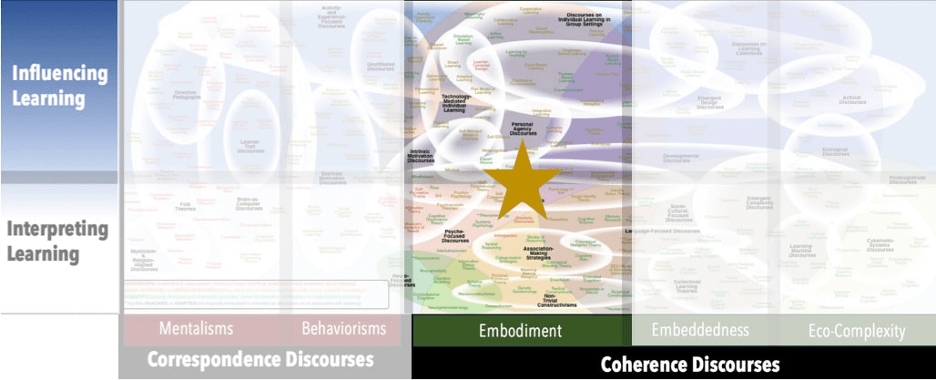AKA
Inner Discourse
Inner Speech
Internal Discourse
Internal Monologue
Self Conversation
Focus
The little voice in your headPrincipal Metaphors
- Knowledge is …
- Knowing is …
- Learner is … an internal narrator
- Learning is … alternating the narrative flow
- Teaching is … coaching; therapy
Originated
Early 1900sSynopsis
Self-Talk refers to the phenomenon that most people, while conscious, experience as an “inner voice” or a silent “talking to oneself.” Self-Talk has been identified by many as a critical site for educational attention, as it is both readily influenced and necessary for higher-level thinking (e.g., planning, problem solving, critical thinking, self-awareness). When positive, Self-Talk can instill confidence, assure perseverance, and encourage exploration. When negative, it can shut one down. Associated constructs include:- Egocentric Speech – technically, any verbal expression in which there is no effort or intention to consider other points of view
- Internalized Speech – silent speech. The notion is typically used to refer to silent Self-Talk that is involves rehearsal, argumentation, reassurance, or some other stress-associated thinking
- Negative Self-Talk (Demotivation) (Albert Ellis, 1960s) – internal dialogue that validates and amplifies negative thoughts – including beliefs, anxieties, anticipations – and thus dampens one’s efforts to engage
- Positive Self-Talk (Albert Ellis, 1960s) – deliberate self-cuing of details that are critical to success in a complicated situation, such as a gymnastics move
Commentary
There has been a surge of interest in Self-Talk over recent decades – especially in the self-help literature, which tends to be awash with advice on positive self-affirmations and pop-psychologistic advice for training the voice within. Theory and research into the efficacy of focusing on Self-Talk is varied, with a weight of opinion leaning toward the suggestion that serious personal issues (e.g., depression) should be left to Psychotherapy, and those matters that directly pertain to schooling be informed by relevant discourses (e.g., Mindset, Metacognition). Across the board, among experts on the topic, there is consensus that Self-Talk is a phenomenon that significantly impacts learning, can be influenced/trained, and thus should be addressed by educators. To that point, variations of the notion figure prominently in the work of Sigmund Freud (Psychoanalytic Theories), L.S. Vygotsky (Private Speech, see Socio-Cultural Theory), Jean Piaget (Cognitive Developmentalisms), and many others.Authors and/or Prominent Influences
Sigmund Freud; L.S. Vygotsky; Jean Piaget; Albert EllisStatus as a Theory of Learning
Broadly speaking, Self-Talk is a discourse on learning, on multiple levels. For example, with regard to personal development, proponents of Self-Talk are interested in the emergence of one’s inner commentary – its social origins, empowering possibilities, biasing constraints, and so on. Or, in the immediate classroom context, it affords insight into personal traits than enable and constrain engagement.Status as a Theory of Teaching
While not originally intended as a theory of teaching, Self-Talk affords insight into how and why learners engage as they do. Consequently, Self-Talk has been used to frame advance on how educators might structure challenges, strategies to productively frame both success and failure, and means to channel self-narration in the service of task analysis. That is, Self-Talk can be readily and appropriately construed to be about teaching.Status as a Scientific Theory
Self-Talk is associated with a substantial empirical literature. At the same time, it appears to be hampered by a substantial popular literature – evidenced in its popularity within a self-help literature that is riddled with unproven-and-overstated claims on its efficacy for overcoming nagging personal issues. Owing to the fact that the discourse is dominated by popular elements, we cannot regard Self-Talk as robustly scientific.Subdiscourses:
- Egocentric Speech
- Internalized Speech
- Negative Self-Talk (Demotivation)
- Positive Self-Talk
Map Location

Please cite this article as:
Davis, B., & Francis, K. (2023). “Self-Talk” in Discourses on Learning in Education. https://learningdiscourses.com.
⇦ Back to Map
⇦ Back to List
